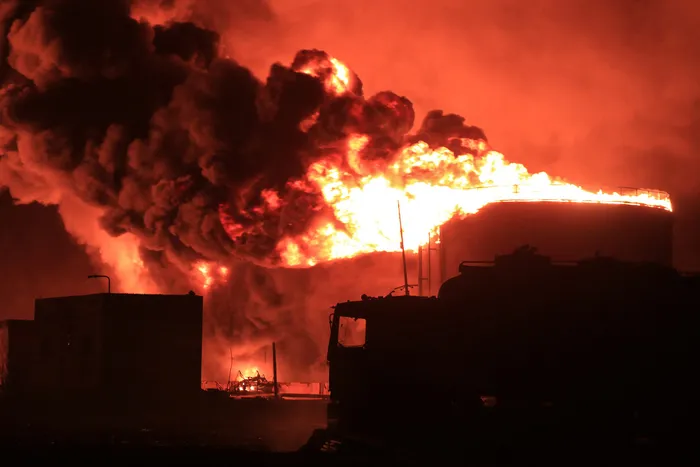Axis of Resistance vs Israel: Is a regional war on the horizon?

A giant fire erupts at an oil storage facility following Israeli strikes in Yemen's Huthi-held port city of Hodeida on July 20, 2024. Israeli warplanes struck the Huthi-controlled Yemeni port of Hodeida on July 20, a day after a drone attack by the Huthi rebels killed a civilian in Tel Aviv, both sides said. Israel has ignored all regional and international brokered efforts to prevent an imminent regional war from breaking out, the writer says. – Picture: AFP
By Aseel Saleh
The Israeli occupation is in a highly tense state of anticipation for Iran’s and Hezbollah’s promised retaliation attacks, after assassinating top leaders of the Axis of Resistance Ismail Haniyeh and Fuad Shukr in the last ten days.
Aiming at protecting their interests, the United States and other countries in the region have been amping up efforts to prevent a regional war from erupting. A joint statement was issued on Thursday, August 8, by the United States, Egypt, and Qatar urging the Palestinian Islamic Resistance Movement (Hamas) and Israel to resume Gaza’s ceasefire and prisoner swap deal negotiations.
“It is time to bring immediate relief both to the long-suffering people of Gaza as well as the long-suffering hostages and their families. The time has come to conclude the ceasefire and hostages and detainees release deal,” the statement read.
The statement urged “both sides to resume urgent discussion on Thursday, August 15 in Doha or Cairo to close all remaining gaps and commence implementation of the deal without further delay”.
A number of officials representing European countries hailed the statement asserting the importance of stopping the war in Gaza, including the President of the European Commission Ursula von der Leyen, the vice-president of the European Commission Josep Borelle Fontelles, Italian Minister of Foreign Affairs Antonio Tajani, and the President of France Emmanuel Macron.
Ministry of Foreign Affairs, European Union and Co-operation of Spain also endorsed the joint statement of the three countries saying: “Spain reiterates its demand for a ceasefire that allows the entry of humanitarian aid and the release of hostages, that contributes to avoid an escalation of regional violence and that facilitates progress in the implementation of the two-State solution, Israel and Palestine, living in peace and security.”
Although the United States diplomatic efforts may be interpreted as endeavours towards peace and truce in the region, it continues to step up its military presence and reiterates its commitment to defend the Zionist state.
The US Defence Secretary Lloyd Austin said on X on Thursday: “I called Israeli Minister of Defence Gallant today to brief him on US force posture adjustments and reinforce my ironclad support for Israel’s defence. The US F-22 Raptors that arrived in the region today represent one of many efforts to deter aggression, defend Israel and protect US forces in the region. I also stressed the importance of concluding a ceasefire deal in Gaza that releases the hostages.”
US Air Force’s 12 F-22 Raptors arrived at Al-Udeid Air Base, in Qatar on August 8, and are intended to “provide increased defensive air support capability, deter any attack, or to intercept any missiles fired towards Israel”, according to media reports.
Iran’s military readiness for the retaliatory attacks on Israel seems to be in full swing as well. Iran’s Islamic Revolutionary Guard Corps (IRGC) said on Friday, August 9, that it added a large number of untraceable anti-ship cruise missiles with new capabilities and high-explosive warheads.
In spite of growing regional tension and international endeavours to contain the situation and evade an imminent war between the Israeli occupation and the Axis of Resistance coalition, Israeli attacks against countries and groups within the coalition have not stopped. The coalition comprises Iran, Lebanon’s Hezbollah, Ansar Allah in Yemen, Palestinian resistance groups in Gaza and the occupied West Bank, the Islamic Resistance in Iraq, and the Syrian Government.
On Thursday, August 8, the Israeli occupation fighter jets launched airstrikes on military installations and buildings in central Syria injuring four soldiers and causing material damage. Other Israeli airstrikes also hit the town of Naqoura in southern Lebanon, killing at least two people. On Friday evening, Israeli warplanes hit a car in Lebanon’s city of Sidon, killing senior Hamas security official Husam al-Hajj.
Early on Saturday morning, Israel carried out a deadly airstrike massacring over 100 displaced Palestinians at al-Tabaeen school in Gaza city as they were praying.
With its persistent assaults on countries and groups affiliated with the Axis of Resistance, Israel has been delivering a daily message to its rivals that it has no intention to de-escalate the conflict, and that it is not interested in achieving security and peace in the region. Israel has even been perceived as deliberately provoking a large-scale war, guaranteeing a US-backed impunity.
Aseel Saleh is a writer at Peoples Dispatch
Related Topics: